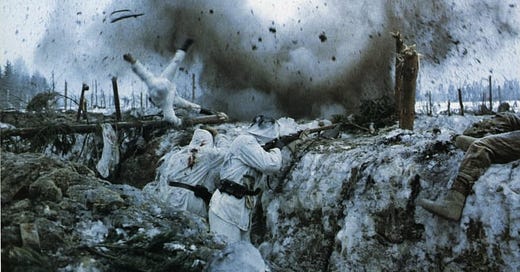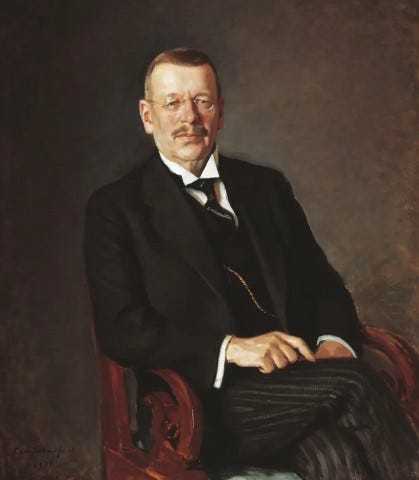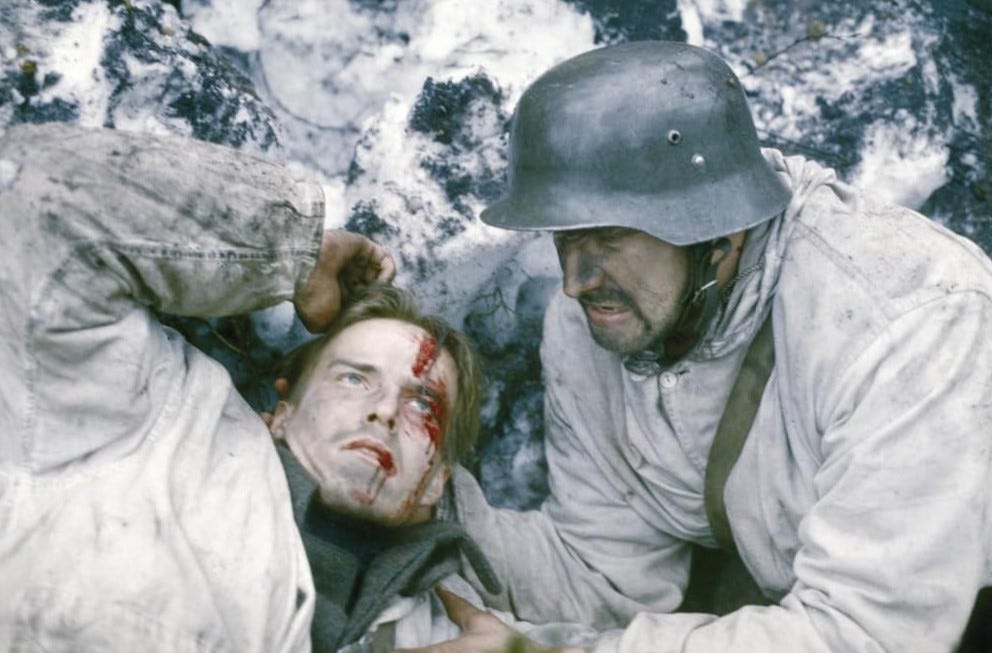“Power trumps rights and exposes all nominal sovereignty.”
Such is the harsh teaching offered by the most esteemed political realist in Finnish history, our former president J. K. Paasikivi (1870-1956). From a young man he took power politics seriously. In the late 19th – early 20th centuries Finland was still part of the Russian empire, and the Tsar wanted to reduce our incredibly generous autonomy as a Grand Duchy. Many Finns were eager to resist out of principle. They reminded the Tsar of the Constitution, of old agreements, of moral principles, of venerable precedents, etc. Even back then Paasikivi knew better:
“When negotiating with a neighboring power, you can only be firm if you have equal or greater power. Otherwise, always compromise.”
This pro-compromise attitude made him unpopular at the time, especially as the surprising collapse of Tsarist Russia led to the success of the more eager, constitutional, ideologically pure types, who made use of the opportunity to attain full Finnish independence from Russia – ironically with Lenin’s help and blessing.
But history was to show that the grim teachings of Paasikivi and other realists were not proven false by such a freak event. In the end the purists had to learn their lesson through a crushing defeat in war.
Ante Bellum
The political situation with Soviet Union grew very tense in 1939. Finnish leaders were invited to Moscow to discuss mutual security. In practice, adjustments to our borders and the renting of a military base for the USSR on the southern coast of Finland. Paasikivi was the man Finland sent to lead the negotiations. Back then he was only a distinguished diplomat, ultimately elected President of Finland after the Second World War. He describes the events in detail in his excellent book, My Acts in Moscow and in Finland 1939-1941 (published posthumously in 1958).
The general text book-media narrative we tend to get taught in Finland is that the proposals Stalin made were unreasonable, impossible, and brutish. The reality revealed by Paasikivi is quite different. In fact, not only did Stalin behave quite politely and reasonably, he also justified his position with reason and moderation, and was even willing to make compromises, as long as his main goal was attained: the improved defensibility of Leningrad. The land he wanted was the area closest to Leningrad, which was separated from the Finnish border only by some dozens of miles. He was even suggesting an exchange: if we give USSR the area in question, they will give us a land doubled that in size on our Eastern border.
The other key demand was a military base on the southern coast, so that the USSR would be able to effectively close the Gulf of Finland from any seaborne enemies. In this case Stalin was willing to talk about the rent, negotiate about the location of the base, and agree on a timetable for the end of the contract after tensions in Europe grew more lax.
In Finland the Soviet demands were very difficult politically, and there always existed the argument that this is only the first stage, and if we show willingness to compromise, they will demand more. Paasikivi admits this is true, but he points out that at the very least compromise would have bought us time. Perhaps time enough for Germany to stir and give USSR more pressing things to consider.
Despite the problem being politically complicated, militarily it was simple. First of all, even were we to agree to the exchange of land, it wouldn’t markedly harm our national defense. All our defensive lines were built much further inland, and would remain untouched. In point of fact, when the war actually came, the ‘uncompromised’ borders were of no use to us, as the actual fighting took place in the previously established defensive positions anyway.
Secondly, our military leadership, chief among them the Marshal of Finland, C. G. E. Mannerheim, made it clear to the politicians that we would absolutely lose any war with the Soviet Union. Our military was too weak, too ill prepared, too badly armed to last more than a few months at most. The warmongers called the Marshal an old, weak, fearful man. The nobleman who had led the Whites to victory 20 years earlier in the Civil War was now pushed aside politically, only to be called back to take charge when the war came. The politicians thought they knew better.
Marshal Mannerheim was also politically savvy enough to understand that no help would be coming. Indeed, this was also the German message to us through back channels: avoid war at all cost, you will receive no meaningful help from anywhere, you will lose. And between the lines: be patient, soon your real moment of opportunity will come.
Unfortunately, our political leadership was not listening either to the Germans or the leaders of our own military. In a haunting prefigurement of the events of Ukraine today, they were listening to the Western Powers, and trusting in International Law, and the League of Nations.
This meant a double punch of gullibility and naivete. Firstly, leaders like our foreign minister Erkko were convinced that the great liberal democratic powers England and France would not stand still as a small northern democracy was attacked by Soviet autocracy. They were half right: it is true the Western Powers didn’t remain exactly inactive, but their modus operandi was not to help Finland out of generosity. It was to use Finland as a drain on Soviet power, to prolong the war, and if possible to draw Germany into the mess, possibly leading to the break up of the Molotov-Ribbentrop pact.
In short, the Western Powers were using Finland as their pawn, as cannon fodder. The dark cynicism of power politics was too much for our naive leaders to grasp. The honest advice from Germany was discounted, and they rather chose to believe sweet lies from the West.
The less said of things like ‘international law’ and ‘the league of nations’ the better. They were exposed as the paper they are the moment Soviet tanks rolled in. It was a damning example of ideological blindness on the part of our leaders. If one really believes in international law, one may begin to imagine it forms some kind of impenetrable force field around the country. Such delusions lost us tens of thousands of lives and the flower of the generation.
Winter War
As there was no compromise, war became inevitable. The USSR quickly walked over the piece of paper that was the non-aggression pact between our two countries by using a cooked up pretense. But unfortunately for them, their leadership had a completely mistaken idea of the internal conditions in Finland.
To their surprise, the nation had been able to largely heal its divisions dating back to the Civil War. Finnish communists were now only a vocal minority, and were quickly dealt with internally. As a whole, the nation was unified, and there was to be no parade march to Helsinki, like the Soviets had dreamed.
An easy walk-in was the notion around which the misguided Soviet assault was planned. It is this initial miscalculation which makes the Finns seem so successful in the war. It was this which allowed us to gain great victories in the first two months. It was this that fed the Finnish propaganda machine. And well did it feast.
By the end of the war the Finns were propagandized to the point that not only did the people think we could last this out, many actually believed we could defeat the Soviet Union! The sheer power of propaganda is something Paasikivi was shocked and awed by, both in Finland and in the USSR.
“When the state gets a strong grip of the propaganda machine, and is able to prevent counter-propaganda, the people can be led absolutely anywhere. Reading the papers, I should have thought Finland was winning.”
The difficulty with propaganda is that when the reality hits, the pre-established lies can destabilize the country. In a democracy it is especially dangerous, because foreign policy can never be led democratically, and thus withstanding the public shock and anger will be a particularly difficult challenge.
“Foreign policy cannot be based on democracy. The man on the street must have no say in it. The leader must direct the common opinion, and never let the common opinion direct him.”
The initial two months of success made Finland’s quick collapse in February 1940 a great shock. The hype around the early success also made our negotiating position more difficult. A cool-headed leader would have tried to open negotiations from a stronger position, say in early January, when our situation was still good. But as said, we had begun to think we could win, or at least out-last.
The beginning of February was the moment when USSR finally changed its tack, and began to take the war seriously. We were quickly pushed to the breaking point, and soon reached a place of desperation where we had to accept any kind of peace the Soviets were willing to throw at us. Either that or become vanquished altogether.
All the early successes now meant nothing, and the Soviets took everything that they had been negotiating for before the war. All that and much more on top. And this time there would not be any talk of exchange or compromise.
We lost large swathes of our most important land-mass, including many of the most fertile and highly industrialized areas. This included one of the most important cities in Finland. Unlike the school books argue, Paasikivi does not believe the lost war improved the respect Finland had in the eyes of Russians. Quite the reverse, it showed we could not last against them in a prolonged conflict when prosecuted seriously, and the war offered tons of material for negative propaganda directed towards us.
History books tend to argue all this was inevitable – and that we would have lost even more had we not fought. After all, the Baltic countries were invaded and made members of the Soviet Union. Again, Paasikivi disagrees. He knew the terms offered before the war to Finland were altogether different from the ones offered to the Baltics. He also knew that in a potential war between Germany and the USSR the Baltic states would be a hundred times more relevant than Finland. As a security issue, Finland’s case was minor. And as proved by the costly war, Finland was geographically much more difficult to take and to hold.
All this meant that our negotiating position before the war had actually been remarkably good, even if we hadn’t realized it. Finland and Russia had had a preceding century of peaceful co-existence together, with happy memories and a sense of trust. Our country was large and costly to conquer, and we posed only a comparatively minor security threat to the USSR. Paasikivi argues that by approaching the negotiations with a more reasonable, compromising position, we could have avoided the war altogether, and the fate of the Baltic states wouldn’t have been ours.
“I shall go to my grave convinced of it.”
Lessons unlearned
It is painfully obvious that the neighbors of Russia have learned precisely nothing from the Winter War, or rather they have learned exactly the wrong lessons. Instead of getting charmed by our own propaganda and driven off-course by foreign influence and naive idealism, we should have kept our cool, believed Mannerheim, and listened to Paasikivi.
I shall end by paraphrasing few of Paasikivi’s core lessons most pertinent to our time.
1.) As a smaller country, independence and sovereignty must never be exaggerated in foreign policy. Both are always conditional to the political reality around you.
2.) There will always be a great power in Eastern Europe, and its national character will be Russian, no matter what the name of the state. This is because Eastern Europe offers everything a Great Power needs. Dreams of destroying Russia are nonsense. It is fundamentally unconquerable as a country. Its strategic depth is insurmountable, its people tough and willing to suffer, and they respect their leaders.
3.) Ukraine and its Little Russians are of existential importance to the Greater Russians of Russia proper. They will fight to the death to keep hold of Ukraine. Just as they did against the Germans.
4.) Peace agreements must not always be fair to be lasting. History knows many unreasonable forced peace agreements which remained permanent. On the other hand, victory has a tendency to blind and charm, which leads to peace agreements that uselessly burn bridges, destabilize, and set the stage for the next war. As indeed we saw in the Continuation War in the Finnish case.
5.) Bismarck said, “small countries are driven by romance, great powers by state interest.” A more ethical form of power politics is impossible, because countries cannot trust each other, and because man is corrupted by sin. Especially in the morally bankrupt and culturally secular modernity, the gullible will get eaten in a machiavellian manner. Homo homini lupus.
6.) The consequence of every war is the degradation of public morality, particularly because of all the ever present lying and distortion of intense propaganda.
7.) Institutions like The League of Nations and the worship of International Law were in fact actively harmful to smaller nations, because they lulled us into naivety and idealism, made us neglect national defense, and disregard the hard realities of power politics.
8.) It is our great fortune that we didn’t follow the siren songs of the Western Powers to the end, but had the wisdom to sue for peace before any real agreements were made, and before any nominal English or French troops had come to Finland. The West did its best to prevent the peace agreement from happening, but thanks be to God we had sufficient wisdom and autonomy to act on our national interest.
Following the West would have dragged us into a great war and turned us into a hacked up butchering ground for Great Power politics. Our fate would have been that of Poland. Or indeed that of modern Ukraine.









